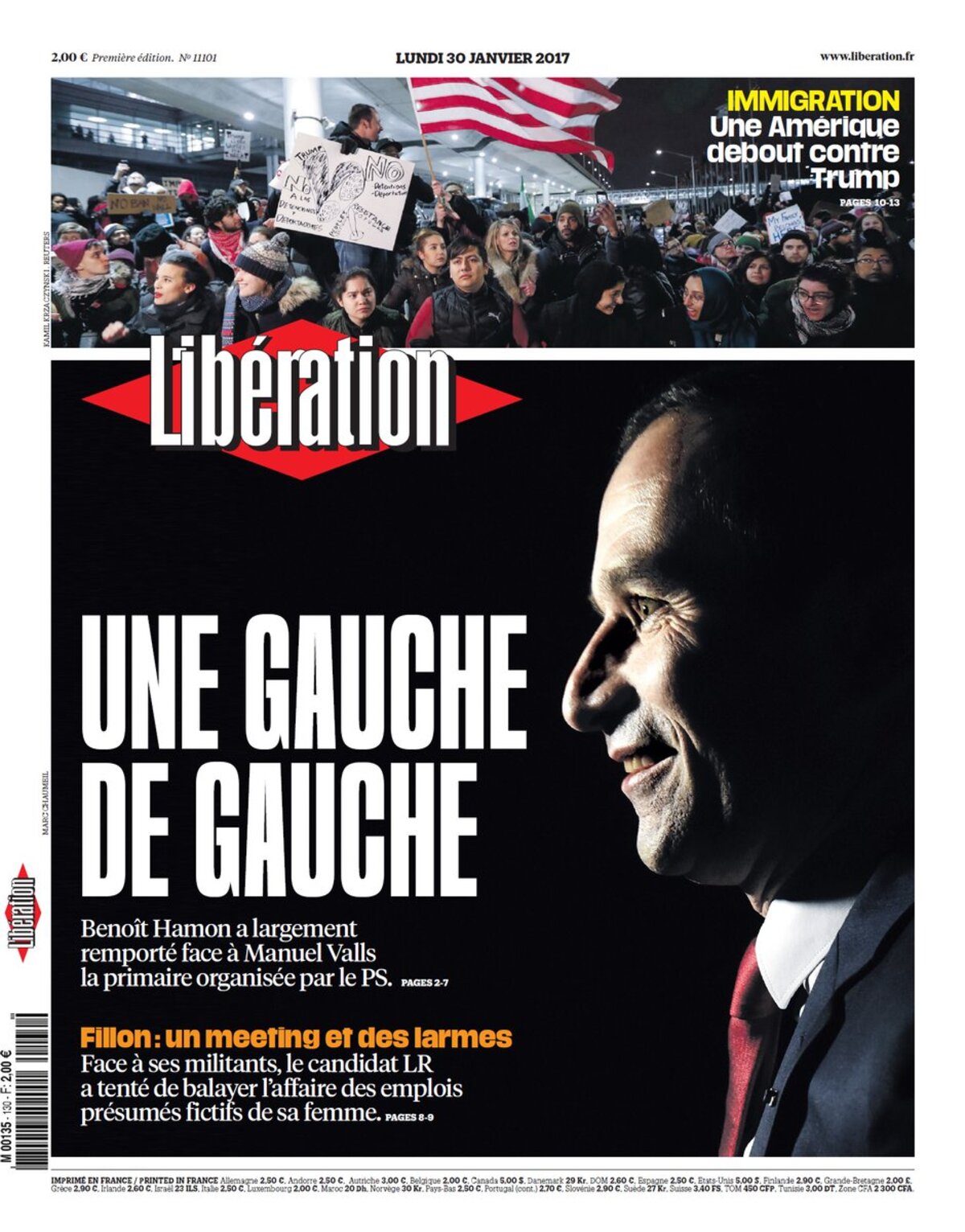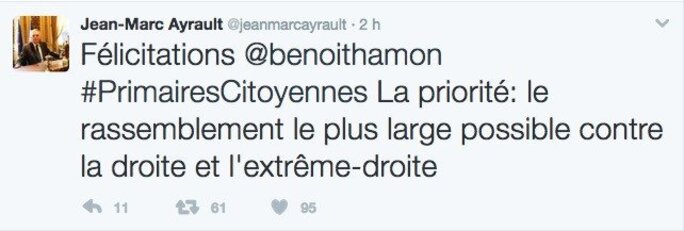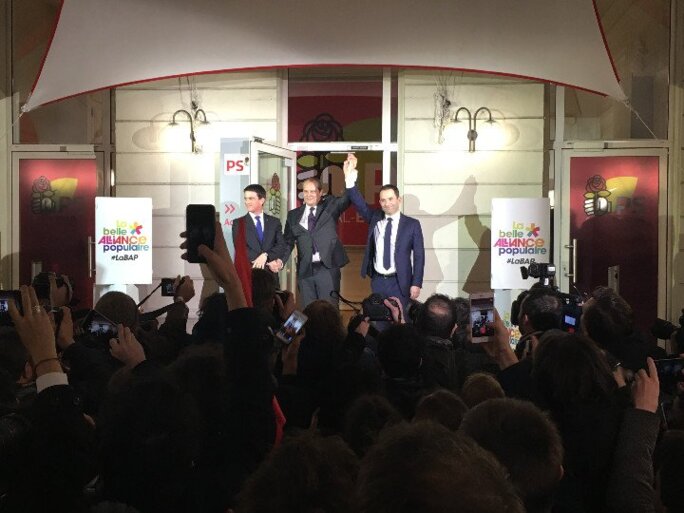This page was updated throughout the evening, running with latest news at the top of page.
All times CET.
Reporting by Graham Tearse
-------------------------
01.45 a.m.: The wrap: tonight’s coverage of the socialist primary election comes to an end here. Benoît Hamon, the leftist candidate who was just weeks ago never tipped by opinion surveys to be a lead candidate, has won the contest in a crushing defeat over Manuel Valls, the candidate on the Right of the party. Valls was previously forecast to win the poll, after he resigned last month as prime minister to enter the race in place of President François Hollande, when the latter announced he would not seek a second term of office.
In the first round last weekend, Hamon eliminated his leftist rival Arnaud Montebourg, the charismatic former economy minister who left the socialist government alongside Hamon in August 2014, and who was previously regarded as Valls’s main opponent, in another embarrassment for the pollsters. Once again, opinion surveys and political commentators failed to recognise the deep current of voters’ intentions. Could their predictions now of a presidential election final round between conservative candidate François Fillon and the far-right Front National candidate Marine Le Pen prove wrong?
Hamon’s victory has put a spanner in the works of all the forecasters. While his chances of success in the presidential elections, even if he enters into an alliance with the radical-left and Green party, still appear at least slim, the removal of Valls from the race changes the battleground for the conservatives and centrist candidate Emmanuel Macron. Will Valls’s supporters rally to Macron, who served as economy minister under Valls and who, for some aamong the former prime minister’s camp, represents the next-best choice? Will that become a serious threat to Fillon, until recently tipped as the frontrunner but who is now reeling from allegations that his wife was unduly paid from MPs funds as his parliamentary assistant?
Meanwhile, the shadow of Marine Le Pen, currently heading opinion polls (but that has already previously proven to be a mirage) hangs heavily over an election in which a protest vote, a rejection of the political establishment, is fuelled by unfulfilled promises and political scandal, however much Le Pen herself is tainted by both. Hamon (who the French media have begun tonight comparing with US Democrat Bernie Sanders), and his future allies, might yet prove to be an antidote.
There has rarely – and some would argue never – been a presidential election race in France that is as uncertain as this. It would be a reckless commentator who would predict the outcome, including, despite all the odds, writing off a radical-left victory, however seemingly unlikely.
As that tried and proven adage, attributed to former British Labour Party leader and prime minister Harold Wilson, has it, “a week is a long time in politics”. Another 13 weeks are left before the presidential elections begin for first-round voting on April 23rd.
01.00 a.m.: This is the cover of Monday's edition of French daily Libération, which headlines "A Left of the Left":

Enlargement : Illustration 1

00.45 a.m.: Among those socialist Members of Parliament who were behind Valls’s campaign and who tonight announced they would not support Hamon’s candidacy, but rather put themselves behind centrist candidate Emmanuel Macron, the former socialist government’s economy minister who is now running for the presidency on an independent ticket, is Alain Calmette and Marc Goua. The latter said: “There is now a cleavage with those who, during the past five years, sabotaged this [socialist government] mandate.” Goua was referring to the Socialist Party MPs who mounted a continued opposition to the rightwing drift of the ruling party.
00.30 a.m.: French foreign affairs minister Jean-Marc Ayrault, who was socialist president François Hollande’s first prime minister until he was replaced after less than two years by Manuel Valls in 2014, tonight congratulated Hamon in a Twitter message which urged: “The priority: the largest possible rally against the Right and far-right”.

Enlargement : Illustration 2

11.57 p.m.: With results in from 7,023 polling booths out of 7,530, representing 97.43% of all taking part in Sunday’s vote, the election organisers announced a 58.87% share of the vote for Benoît Hamon, and 41.13% for Manuel Valls. A remaining 1.43% of votes were made up of “white ballots”, indicating a protest vote, and others that were unrecognisable (which can be protest votes but also incoherent choices).
10.40 p.m.: The first clear cracks are showing. While some of Valls’s high-profile supporters have said they will now unite behind Hamon in the name of party solidarity, there are many press reports tonight of others, not many of whom were named, who, speaking at the former prime minister’s campaign HQ, who said they would now rally behind centrist Emmanuel Macron, who served under Valls as economy minister before resigning last summer to launch his independent presidential bid.
10.30 p.m.: Interestingly, socialist president François Hollande, once the party's leader, has not reacted to Hamon’s victory tonight, preferring instead to congratulate, via his Twitter account, France’s handball team (see below) which tonight won the sport’s world cup final in Paris. Hollande, who has proven to be the most unpopular French head of state since opinion poll evaluations began, announced in December he would not run for re-election after clearly intending, for months, to run in the primaries, under pressure from Valls. He might want to thank him now for avoiding what would clearly have been a crushing and humiliating defeat. According to press reports, Hollande, 62, did not take part in the vote.

Enlargement : Illustration 3

10.23 p.m.: Shortly before 10p.m. Hamon and Valls appeared together at the Socialist Party headquarters in central Paris for a long-planned public handshake between the candidates in front of the cameras, captured here by Mediapart political correspondent Christophe Gueugneau.

Enlargement : Illustration 4

10.18 p.m.: In the latest figures issued by the organizers of the socialist primaries, and which follow a count of 77.48% of polling stations, Benoît Hamon’s score is up by a fraction at 58.87% of votes cast, against Manuel Valls’s score of 41.13%.
10.15 p.m.: French rolling news TV channel LCI tonight released the results of an opinion poll it commissioned which forecast voting intentions in the first round of the presidential elections, still three months away. It gives Hamon 15%, against 10% for Mélenchon. The three frontrunners ahead of both were centrist Emmanuel Macron (21%), the conservative Les Républicains party’s François Fillon (22%) and the far-right Front National leader Marine Le Pen (25%).
9.12 p.m.: Speaking to his supporters tonight, Benoît Hamon proposed to Green candidate Yannick Jadot and radical-left rival Jean-Luc Mélenchon that all together they “build a majority for government”. Hamon said “tomorrow I will begin by rallying together all the socialists, because it is my political family”. He said the divisions with the Socilaist Party were “not insurmountable” in face of its “true adversaries” that were the Right and the far-right. “I don’t believe in providential men,” he added. “I prefer the ‘us’ to the ‘I’.
9.10 p.m.: Manuel Valls has admitted defeat in a short speech: “My dear compatriots, with this second round the primary of the Left comes to an end. The French people have expressed themselves, more numerous than in the first round but not enough to reverse the course of events. Benoît Hamon has won it and I would like to warmly congratulate him. We will meet together in a moment at the rue de Solferino.” The “rue de Solferino” is the address of the Socialist Party. Valls had been hoping that a higher turnout on Sunday as opposed to last weekend’s first round would above all be a mobilization of his own supporters.
9.05 p.m.: The presidential campaign coordinators of radical-left candidate Jean-Luc Mélenchon, who stands to lose out from the election of Hamon, whose manifesto overlaps that of Mélenchon, issued a statement that sets the tone of division. “The real campaign begins Monday,” read the statement. Benoît Hamon was the vote that allowed for the punishment of the government’s policies. From now he will be the candidate of the Socialist Party [which has been] in power for five years. To listen to him, he is intent on maintaining his candidature whatever happens. In that case he could carry a heavy responsibility on what follows.”
Which is a clear indication that Mélenchon, who until now appears to have had growing support for his campaign, fears a serious dent in his share of the vote in April’s presidential election first round as a result of Hamon’s victory.
8.50 p.m. Hamon wins. The president of the organising body of the primary elections, Thomas Clay, has announced the first results of the election, showing Benoît Hamon as having garnered 58.65% of the vote, against 41.35 for Manuel Valls.
8.45 p.m.: Reports from the campaign HQs of the two candidates suggest the Hamon camp is the happiest.
8.40 p.m.: Results are expected by 9p.m.
8.35 p.m.:Voting in the 7,530 polling stations across France began at 9 a.m. and ended at 7 p.m. The organizers of the elections announced that by 5 p.m., a total of 1,306,852 votes were cast in 75% of polling stations. That represents an increase in last Sunday’s first-round vote.
8 p.m.: Background and what is at stake: The second and final round of voting to choose the presidential candidate to represent France’s Socialist Party and its allies took place on Sunday, open to all the registered electorate on condition that they sign a pledge that they share the values of the Left – and pay a 1-euro fee.
The choice was between the two candidates who garnered the highest score in last Sunday’s first-round vote, which saw leftist Benoît Hamon with a comfortable lead over second-placed Manuel Valls, who last month resigned as prime minister to launch his bid.
Hamon, 49, who briefly served as education minister under Valls, represents the Left of the party, and embodies the current that rebelled against the ruling socialist government’s policy direction under Valls and President François Hollande, regarded by the rebels as betraying socialist principles, steering rightwing measures of austerity and a business-friendly bias at the expense of social policies. Hamon’s core proposition is the introduction of a monthly 750-euro universal basic income for every adult, but he also wants to see a reduction in the working week, the overturning of Valls’s controversial labour law reform which watered down employees’ rights, the legalization of euthanasia and also the use of cannabis, all of which is opposed by Valls.
Valls, 54, has had to defend his unpopular government’s record, and although he has changed opinion on some of its stands, such as the free use of a decree that bypasses parliamentary approval for the adoption of laws, and which he used to bulldoze through his labour law reforms, he has placed at the fore his experience of office, and his image of authority in countering terrorism. He wants to introduce a national “civic” service for all young adults. Valls stands out more for what he does not agree with in Hamon’s manifesto, which includes his opposition to the introduction of proportional representation and the granting of voting rights to nationals from non-European Union countries resident in France.
The choice on Sunday will be crucial for the future of the divided and beleaguered Socialist Party, whoever wins. The result is likely to cause an enduring schism between the party’s Left and Right, amid speculation that the two currents of opinion may not hold together behind the chosen candidate even in the campaigning for the two-round presidential elections which begin in April.
The deep unpopularity of socialist president François Hollande, and his government, suggest that neither Hamon nor Valls would succeed in becoming lead candidates, but both could have a significant influence on the votes cast for their rivals: Hamon’s manifesto cuts into ground occupied by radical-left independent candidate Jean-Luc Mélenchon, while if Valls’s is defeated on Sunday the middle ground centrist and rightwing vote would be represented by maverick former economy minister Emmanuel macron and the conservative François Fillon, currently battling a scandal of alleged fake job payments made to his wife.
Sitting in the wings is the far-right Front National party candidate Marine Le Pen, whose popularity ratings suggest she will, on current form, reach the second-round playoff in May. In the run-up to the most uncertain presidential elections in recent history, the socialist choice of its candidate will have more consequences than the future political direction of the party alone.


